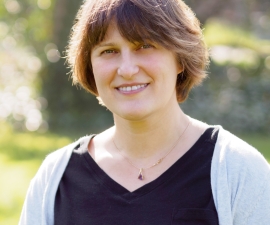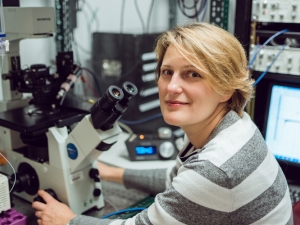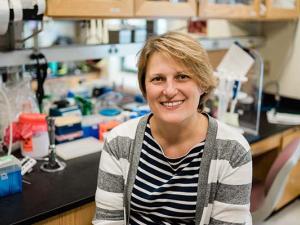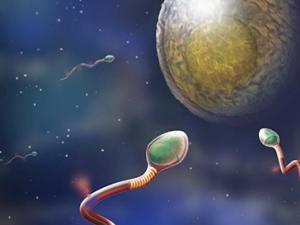

Research Expertise and Interest
Reproductive and Developmental Biology, ion channels, Physiology of Fertilization and Early Embryo Development
Research Description
Research in Lishko Lab is focused on the cell biology of mammalian fertilization. They study the molecular mechanisms that regulate egg fertility, sperm motility and the acrosome reaction. A better understanding of these processes will lead to the development of novel approaches to control and preserve human fertility, improve the human reproductive health worldwide and advance family planning.
Current Projects
Ion channels of the flagellum. Sperm motility and their ability to find and fertilize an egg are dependent on several factors, including ion homeostasis, which is controlled by ion channels and transporters. Ion channels are specialized integral membrane proteins that form ion-conducting pores in normally non-conducting membranes. Ion channels of the sperm cell open in response to environmental cues of the female reproductive tract, thus changing conductance of the sperm plasma membrane and sperm behavior. The physiological importance of sperm ion channels has inspired numerous attempts to identify and characterize them. However, for about 20 years, these attempts had been frustrated by the inability to apply methods of contemporary biology to the sperm cells due to their small size, specific morphology and vigorous motility. The sperm patch clamp technique has, in just a few years, produced a gigantic leap in our understanding of the function of these ion channels and their role in flagellar motility. We use this method to study flagellar ion channels and to shed light on the molecular mechanisms underpinning sperm-egg interaction and the environment of the female reproductive tract during the process of fertilization. This will help us to understand more about the early beginning of life, open new avenues in the treatment of human infertility, and create a new generation of nonhormonal contraceptives.
Non-genomic steroid signaling in reproductive biology. Steroid hormones are known to exert their powerful and rapid influence via an unconventional non-genomic mechanism by interacting with their membrane receptors and altering the function of ion channels or G-protein coupling receptors. Some examples include: 1) the bronchodilatory effect of the stress hormone cortisol and other glucocorticoids; 2) activation of the TRPM3 channel in insulin-producing cells in response to pregnenolone sulfate (PS); 3) activation of translationally silent spermatozoa by progesterone; 4) onset of anesthesia in rodents in response to progesterone injection; and 5) rapid enhancement of muscle performance in athletes in response to androgens. Despite these well-documented effects, the identity of the steroid targets and the downstream pathways remain obscure. Recently, by using transcriptionally silent spermatozoa as a model, we identified the novel membrane progesterone receptor and elucidated the signaling pathway that is initiated by association of progesterone with its target. The identification of this long-sought membrane progesterone receptor of human sperm cells—the α/β hydrolase domain–containing protein 2 (ABHD2)—opened a new chapter in understanding the molecular basis of the steroid action. Monoacylglycerol lipase ABHD2 is the first evolutionarily conserved steroid-activating enzyme that hydrolyzes endocannabinoid 2- arachidonoylglycerol . Interestingly, the steroid specificity profile of ABHD2 indicates that it is activated by progesterone and PS, while testosterone and cortisol act as competitive antagonists. We found that ABHD2 is highly expressed in reproductive tissues. We combine mouse genetics, electrophysiology, biochemistry, and genome editing to elucidate the molecular basis of unconventional steroid signaling in the reproductive tissues. The precise understanding of the mechanisms by which steroid hormones govern important physiological functions is vital to developing successful treatments for many endocrine disorders.
In the News
For Berkeley Scientist Polina Lishko, a Time of Sadness and Anger for Ukraine
Four Innovative Faculty Members Awarded Campus’s 2022 Bakar Prize
Contraceptive researcher Polina Lishko receives MacArthur “genius” award
Beyond Hormonal Birth Control
Five innovators join the ranks of the Bakar Fellows
Folk contraceptives lead researchers to drugs that block fertilization
Preventing sperm’s ‘power kick’ could be key to unisex contraceptive
UC Berkeley biologists have discovered the switch that triggers the power kick sperm use to penetrate and fertilize a human egg, uncovering a possible source of male infertility but also a potential target for contraceptives that work in both men and women.






